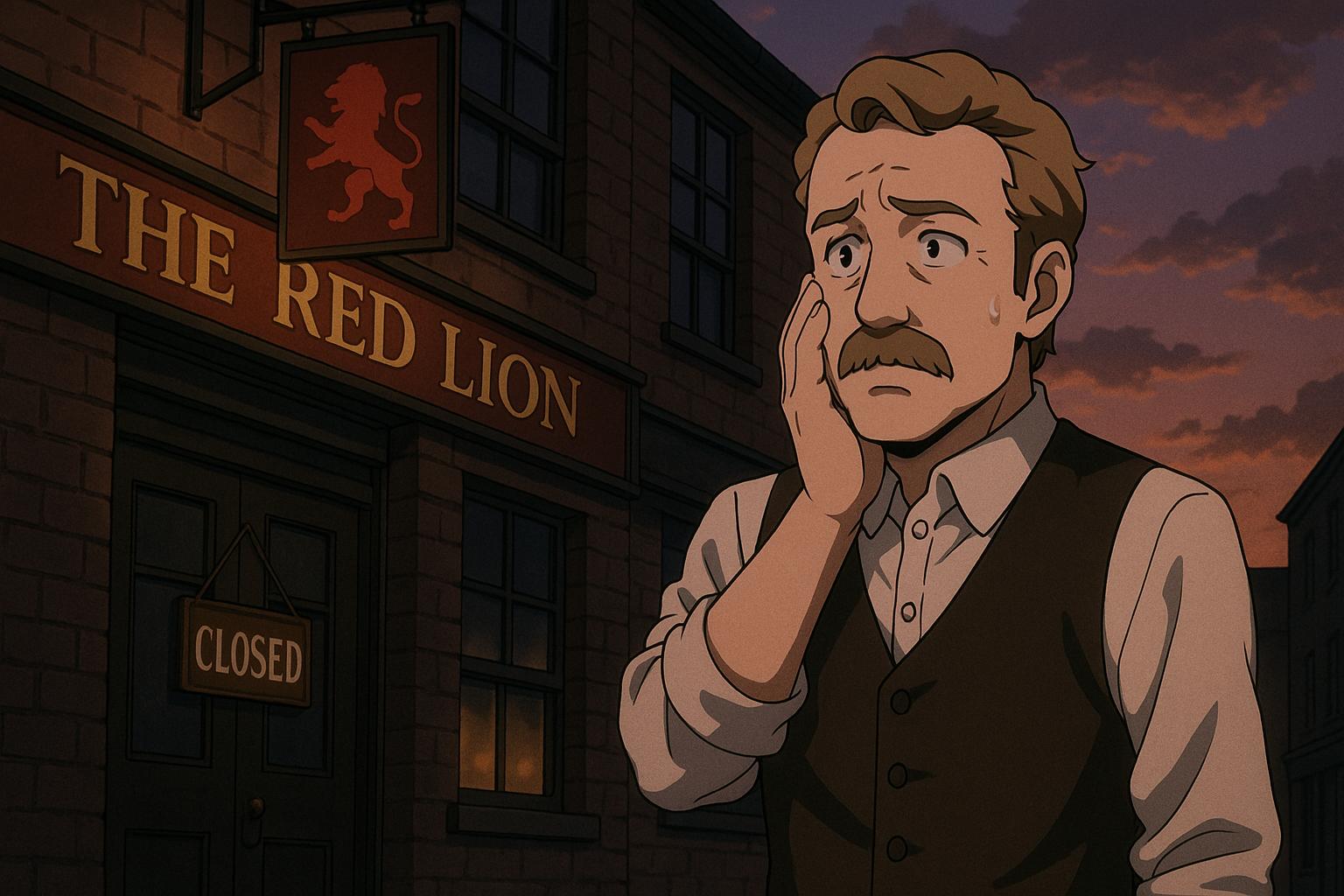Following Chancellor Rachel Reeves’s recent budget decisions, UK hospitality businesses face soaring costs and widespread losses, with industry leaders warning that sustained tax and wage hikes could force many pubs and restaurants to close, risking thousands of jobs and escalating consumer price rises.
The recent budgetary changes introduced by Chancellor Rachel Reeves have sparked serious concerns regarding the future of the UK hospitality sector. With one in three hospitality businesses now reported to be operating at a loss, industry leaders warn that further tax hikes could precipitate a wave of closures across pubs and restaurants. This alarming trend represents a significant escalation from previous quarters, highlighting the precarious state of an industry already grappling with rising operational costs.
Research conducted by key industry bodies, including UKHospitality and the British Beer and Pub Association, reveals that around 60% of firms within the sector have been compelled to reduce their workforce in order to stay afloat, with a staggering £3.4 billion in additional costs hitting the industry since April. Echoing these findings, a survey indicated that more than three-quarters of hospitality operators have increased their prices, further burdening consumers who are already facing financial constraints. The groups representing these businesses have articulated a desperate plea for government intervention, asserting, “Jobs are being lost, livelihoods under threat, communities set to lose precious assets, and consumers are experiencing price rises when wallets are already feeling the pinch.”
The Chancellor’s recent budget implementations, specifically the increases in employers’ National Insurance Contributions and adjustments to the national minimum wage, have taken a particularly heavy toll on the sector. Industry officials argue that these reforms, which went into effect in April following Reeves’s first budget last October, have exacerbated existing financial issues. They advocate for immediate reconsideration of the National Insurance hike and are calling for a permanent reduction in VAT on food and drink served in hospitality venues, as well as necessary reforms to the business rates system.
Adding to the sector’s troubles, the Confederation of British Industry (CBI) has released a dismal assessment of private sector confidence, claiming it to be at its lowest since September 2022. Deputy chief economist Alpesh Paleja emphasised that the current climate necessitates “decisive action to restore business confidence and boost growth.” Similarly, Make UK, which represents British manufacturers, has urged Labour to cut industrial energy costs, stating that they are four times higher than those in the US and 46% above the global average. Stephen Phipson, the chief executive of Make UK, cautioned that failing to tackle these high costs might jeopardise the UK’s industrial security and deter potential investors.
The British Beer and Pub Association, alongside other hospitality organisations, reported that if taxes rise and Covid-era business rates relief ends, more than half of hospitality businesses would resort to cutting jobs or halting future investments. This sentiment echoes concerns raised by UKHospitality that recent tax policies will not only lead to job losses but could also threaten smaller businesses, which lack the capacity to offset these increased costs through price increases.
Furthermore, brewers and hospitality operators have warned that rising taxes on alcohol and other sectors could signal the demise of the “affordable pint,” a staple of UK culture. The industry maintains that it is already struggling to absorb rising expenses, and the imposition of additional taxes could curtail consumer spending and lead to closures.
The situation is dire; nearly 90% of venues surveyed by the Night Time Industries Association expect declines in profits, with 40% contemplating closure within the next six months. The hospitality industry is urging policymakers to act decisively to avert a deeper crisis, arguing that continuing on the current trajectory could have lasting repercussions for the sector and the broader economy.
In light of these challenges, the future of the hospitality sector hangs in the balance. With calls for government support amplifying, the path ahead requires immediate strategic engagements to ameliorate the pressures facing this vital industry, which plays a crucial role not only in the economy but also in the social fabric of communities across the UK.
Reference Map:
- Paragraph 1 – [1], [2]
- Paragraph 2 – [1], [4], [5]
- Paragraph 3 – [2], [3], [6]
- Paragraph 4 – [4], [6]
- Paragraph 5 – [3], [5], [7]
Source: Noah Wire Services
- https://www.dailymail.co.uk/money/markets/article-14769935/Chancellors-Budget-hangover-leaves-pubs-red.html?ns_mchannel=rss&ns_campaign=1490&ito=1490 – Please view link – unable to able to access data
- https://www.theguardian.com/business/2024/oct/28/pubs-and-restaurants-warn-of-closures-if-taxes-rise-and-business-rates-relief-ends – In October 2024, the British Beer and Pub Association, the British Institute of Innkeeping, and UKHospitality jointly warned that pubs and restaurants could face closures if taxes rise and business rates relief ends. A survey revealed that 54% of hospitality businesses would reduce employment levels, and 51% would cancel planned investments if full business rates were reintroduced. The groups called for the government to make the Covid-era rates relief permanent to support the struggling sector.
- https://www.theguardian.com/business/2024/nov/10/uk-diners-already-fear-the-bill-but-the-budget-just-raised-it-again-warn-restaurateurs – In November 2024, UKHospitality, representing over 200 hospitality businesses, warned that recent tax increases, including hikes in employers’ National Insurance contributions and the National Living Wage, would lead to higher costs for consumers. The trade body expressed concerns that these measures could result in small business closures within a year, drastic job cuts, and cancelled investments, urging the government to reconsider the impact on the hospitality sector.
- https://www.bbc.co.uk/news/articles/c0k8n1lpv1lo – In November 2024, over 200 pub and restaurant bosses warned Chancellor Rachel Reeves that tax rises in the recent Budget would ‘unquestionably’ cause closures and job losses. They highlighted the disproportionate impact of increased National Insurance contributions on the hospitality industry, stating that businesses had ‘no capacity to pass the costs onto customers,’ leading to potential job cuts and closures of smaller firms.
- https://www.telegraph.co.uk/politics/2024/10/08/budget-could-mean-end-affordable-pint-brewers-warn/ – In October 2024, brewers and hospitality firms warned that increasing taxes on alcohol and pubs in the Budget would spell ‘the end of the affordable pint.’ They stated that the industry ‘cannot afford other costs, let alone tax increases,’ and that higher taxes would lead to reduced consumer spending and potential closures of pubs and brewers across the country.
- https://www.standard.co.uk/business/rachel-reeves-autumn-budget-bars-pubs-clubs-national-insurance-alcohol-duty-b1193259.html – In November 2024, the Night Time Industries Association (NTIA) warned that London’s late-night economy was in ‘severe jeopardy’ due to additional costs imposed by the Budget, including increases in employer National Insurance contributions and the National Living Wage. A survey of over 500 member venues found that almost 90% expected a downturn in profits, with 40% considering closure within the next six months.
- https://inews.co.uk/news/politics/cost-pint-meal-rise-pay-budget-tax-hikes-3351186 – In November 2024, UKHospitality urged the government to maintain a permanently reduced business rate and to apply the proposed rise in employer National Insurance contributions to higher earners only. They warned that failing to do so would reduce job creation and hinder growth in the hospitality sector, which is already facing challenges due to the end of the business rates relief scheme introduced during the Covid-19 pandemic.
Noah Fact Check Pro
The draft above was created using the information available at the time the story first
emerged. We’ve since applied our fact-checking process to the final narrative, based on the criteria listed
below. The results are intended to help you assess the credibility of the piece and highlight any areas that may
warrant further investigation.
Freshness check
Score:
7
Notes:
The narrative presents recent developments concerning the UK hospitality sector’s challenges following Chancellor Rachel Reeves’ budgetary changes. Similar reports have emerged in the past six months, notably in October and November 2024, highlighting concerns about increased operational costs and potential closures. For instance, a report from October 2024 discusses pubs and restaurants warning of closures if taxes rise and business rates relief ends. ([theguardian.com](https://www.theguardian.com/business/2024/oct/28/pubs-and-restaurants-warn-of-closures-if-taxes-rise-and-business-rates-relief-ends?utm_source=openai)) While the core issues remain consistent, the inclusion of updated data and recent quotes suggests a moderate freshness score. However, the recurrence of similar narratives across various outlets indicates a degree of recycled content. Additionally, the report appears to be based on a press release, which typically warrants a higher freshness score due to its direct release of new information. Nonetheless, the overlap with previous reports and the reliance on a press release suggest a need for cautious interpretation. ([theguardian.com](https://www.theguardian.com/business/2024/oct/28/pubs-and-restaurants-warn-of-closures-if-taxes-rise-and-business-rates-relief-ends?utm_source=openai))
Quotes check
Score:
6
Notes:
The report includes direct quotes from industry leaders and organisations, such as UKHospitality and the British Beer and Pub Association. A search reveals that similar statements have been made in earlier reports, indicating potential reuse of content. For example, a letter from over 200 hospitality bosses to the Chancellor, warning of closures and job losses, was reported in November 2024. ([bbc.co.uk](https://www.bbc.co.uk/news/articles/c0k8n1lpv1lo?utm_source=openai)) The recurrence of identical quotes in multiple reports suggests a lack of originality in the narrative’s sourcing. ([bbc.co.uk](https://www.bbc.co.uk/news/articles/c0k8n1lpv1lo?utm_source=openai))
Source reliability
Score:
8
Notes:
The narrative originates from the Daily Mail, a widely recognised UK newspaper. While it is generally considered reputable, the Daily Mail has faced criticism for sensationalism and accuracy issues in the past. Given the reliance on a press release and the presence of similar reports in other reputable outlets, the source’s reliability is moderate. ([theguardian.com](https://www.theguardian.com/business/2024/oct/28/pubs-and-restaurants-warn-of-closures-if-taxes-rise-and-business-rates-relief-ends?utm_source=openai))
Plausability check
Score:
7
Notes:
The claims regarding the impact of budgetary changes on the hospitality sector align with reports from other reputable outlets. For instance, the Financial Times reported on the significant financial setbacks faced by the pub industry following the budget announcement. ([ft.com](https://www.ft.com/content/3ef01897-6c46-4411-9cd5-9754f581a9a4?utm_source=openai)) The consistency of these reports across multiple sources supports the plausibility of the narrative’s claims. However, the reliance on a press release and the presence of similar content in other reports suggest a need for cautious interpretation. ([ft.com](https://www.ft.com/content/3ef01897-6c46-4411-9cd5-9754f581a9a4?utm_source=openai))
Overall assessment
Verdict (FAIL, OPEN, PASS): OPEN
Confidence (LOW, MEDIUM, HIGH): MEDIUM
Summary:
The narrative addresses recent challenges faced by the UK hospitality sector following Chancellor Rachel Reeves’ budgetary changes. While the inclusion of updated data and recent quotes suggests some freshness, the recurrence of similar content across various outlets and the reliance on a press release indicate a degree of recycled material. The source’s reliability is moderate, and the claims’ plausibility is supported by reports from other reputable outlets. Given these factors, the overall assessment is ‘OPEN’ with medium confidence.













